Originally posted by Carlin
View Post
"Prior to 1865, Vlachs everywhere in the Peloponnese"
Collapse
X
-
Google Translation of some parts (most of the toponyms below apply to the Peloponnese):Originally posted by Carlin View PostWhy and when did village names change?
Γιατί και πότε άλλαξαν τα ονόματα των χωριών;
http://antikleidi.com/2015/10/07/onomata_xorion/
1) At that time folklore began to appear and with the first laws for the administrative division of the country began to borrow from Greek antiquity names for the regions, prefectures, provinces, municipalities and settlements, ignoring the old historical names. Very soon the name of Morea was replaced by the Peloponnese, Roumeli replaced by Sterea, Evropos by Euvoia. In the first decree of 3 April 1833, we see the first provincial denominations. But also the newly created Municipalities took ancient Greek names. The names of the mountains are also changed: Vodias (Παναχαϊκό), Ziria (Κυλλήνη), Liakoura (Παρνασσός), Helmo (Αροάνια).
2) Until 1909, 23 settlements were renamed. And then there is a great incision. It was decided that the organized national enterprise for the Hellenization of the names of the settlements with the decree "on setting up a committee to study the toponyms of Greece and the verification of their historical discourse". After the end of the Balkan wars and under the pressure of critical national issues, the Greek state decided massive Hellenization by changing all the names of cities and villages that did not have a Greek root but Turkish, Slavic, Vlach, Arvanite or otherwise, with the reasoning that toponyms should be in line with the official language, Greek. For this reason, prefectural committees were set up by professors, archaeologists, ordinary civil servants, who officially took over the patriotic duty of the government under a legislative decree of 1926 (ratified by a new decree of 13 November 1927 and Law 4096/1929) Renaming the foreign-sounding names of settlements, villages and towns, even providing for legal sanctions for offenders.
3) The committees set up for these purposes, in their attempt to change the names, often came to grotesque results. They filled the map of Greece with 34 Kallitheas, 10 Achladies, 22 Milies, 18 Platanias, 21 Kastanies, 14 Cherrasia, 25 Kalyvia, 11 Kefalovrysa and so on.
4) Until 1928, about 2,500 settlements are renamed! This year, the first names changes were made in our area (meaning in a specific area in Peloponnese): Arphara were named Ampelokipoi and Vlovoka was named Aigai. Between 1929-1952 there are 354 names. During the five-year period of 1953-1957, there were 760. In 1955, in particular, it was the year of the mass change in the names of our villages, namely: Arahova became Εξοχή, Vergouvitsa became Μοναστήρι, Svyro became Όαση, Valkuvina became Άμπελος. In 1957, the renaming process was completed (locally) with Versova (Βερσοβά), which became Chrysanthio.
5) The interior ministry approves sporadically a renaming of "barbarous" settlements, such as that of «Νέων Λιοσίων» to «’Ιλιον», in September 1994.
6) Apart from this historical review, it is also interesting to find out what those names mean, despite their compulsory change (through the national politics of the last century), they do not go out of the folk and they are used unchanged from generation to generation for hundreds of years.
Comment
-
-
- Oι Μανιάτες ονομάζουν «Βλάχους» όσους κατοικούν βορειότερα από αυτούς = The Maniates call "Vlachs" those who live north of them
- Maniots/Maniates: "However, they (were so exalted that they were working and fighting to liberate the Vlachs, as they called the other Peloponnesians."
 Οι Μανιάτες στην Εθνεγερσία του 1821
Οι Μανιάτες στην Εθνεγερσία του 1821
- Just like the Maniots, the Tsakonians called outsiders Vlachs. A quarter of the houses in Lenidi were owned by "strangers from the surrounding villages."
 When Thanasis Costakis, fresh out of high school, sat down in 1930 with Hubert Pernot to give him language data, Tsakonian was still quite d...
When Thanasis Costakis, fresh out of high school, sat down in 1930 with Hubert Pernot to give him language data, Tsakonian was still quite d...
- The Turkish traveler Evliya Tchelebi found in 1668 people in Morea who spoke five different languages, which he names: 1) The Common Greek, which was spoken by all ethnic groups, Muslims (Turks) and Christians alike. 2) Arvanitika, spoken by the Arvanites in Argolido-Corinthia and elsewhere. 3) Tsakonika. 4) The language that characterizes very pure scholarly Greek, in Mystras; and 5) The language spoken by "the unbelievers of Mani" whom they say use expressions that are neither Greek nor Arvanite.
What was this fifth language?
Mani and the Maniates, John Antonakos
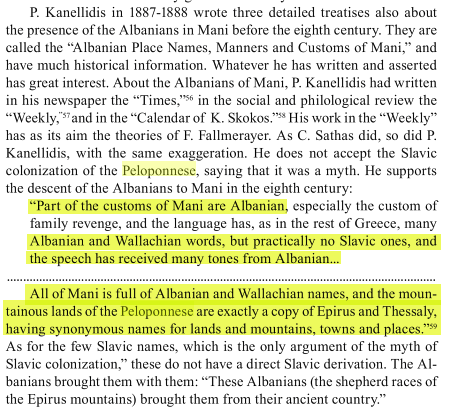 Last edited by Carlin; 05-13-2017, 08:22 PM.
Last edited by Carlin; 05-13-2017, 08:22 PM.
Comment
-
-
-
Source: Asimakis, Stathis (Ασημάκης, Στάθης) - Toponimia
Page 21 - Since three important names of the Peloponnese: Arahova, Araklovo and Akova mentioned in the Chronicle of Morea - for which a detailed analysis in the next section follows - are Latin (Vlach) and not Slavic origin.............The Vlachs came to the Peloponnese well before the thirteenth and fourteenth centuries, and well before the Fourth Crusade..........It is possible that the Vlachs arrived in the Peloponnese in waves from the 8th century - a time when Slavic tribes did, in fact, appear in Morea - until the 12th century.
Page 160 - Vlachs reached and arrived as far south as Messenia and Laconia.
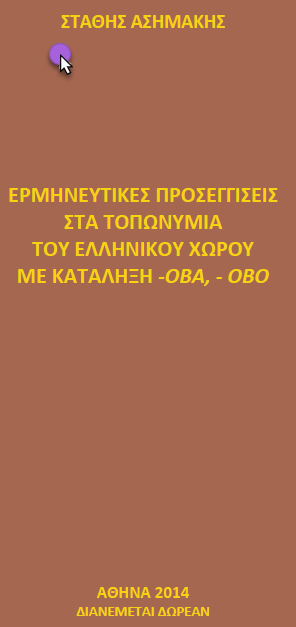
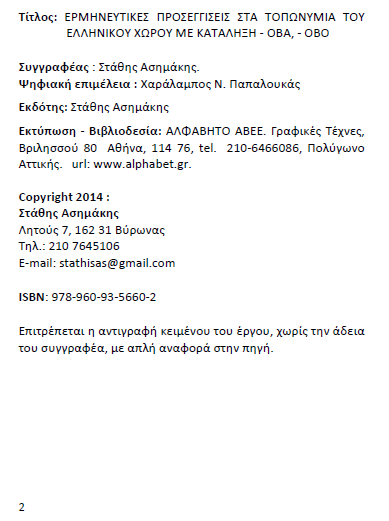
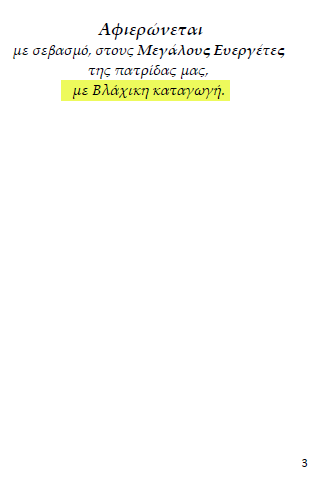
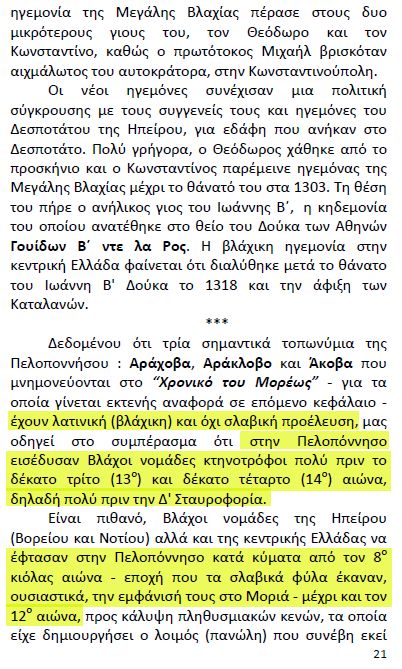
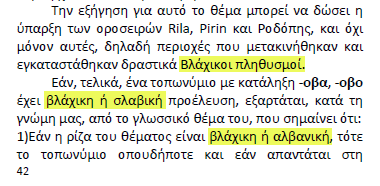
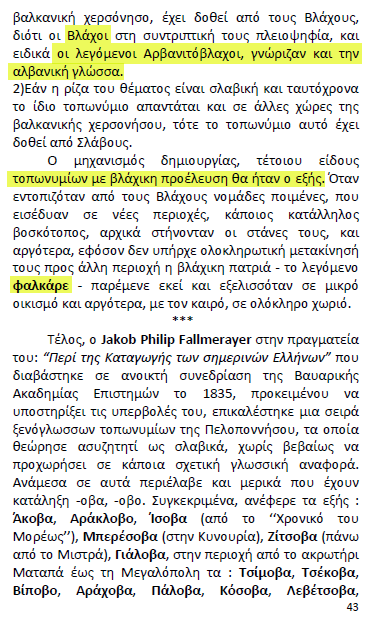
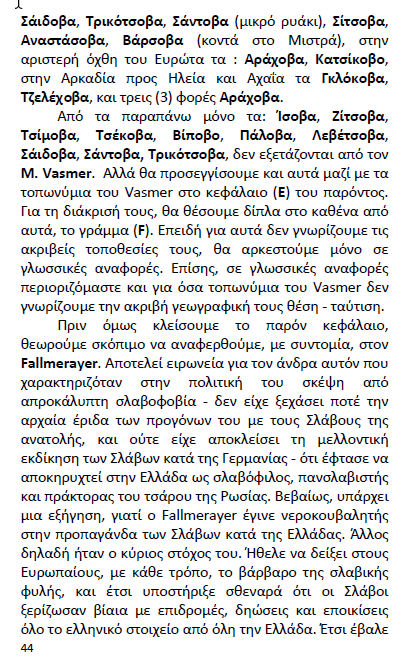
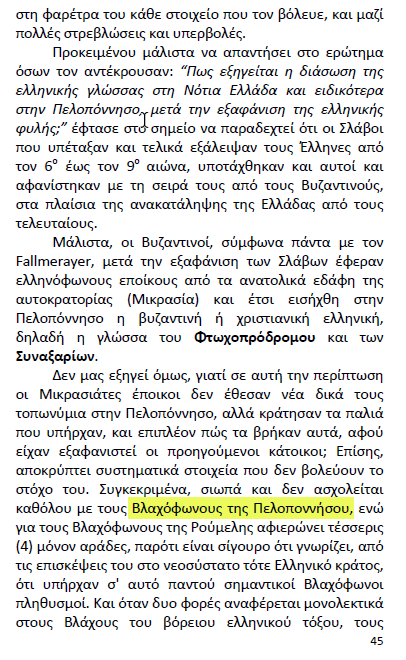
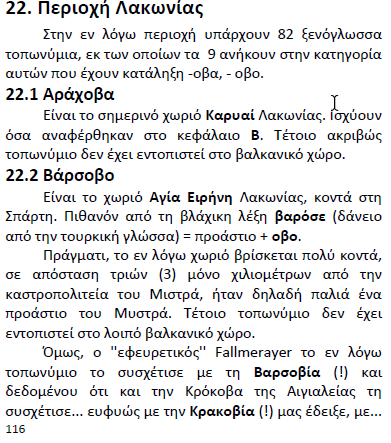
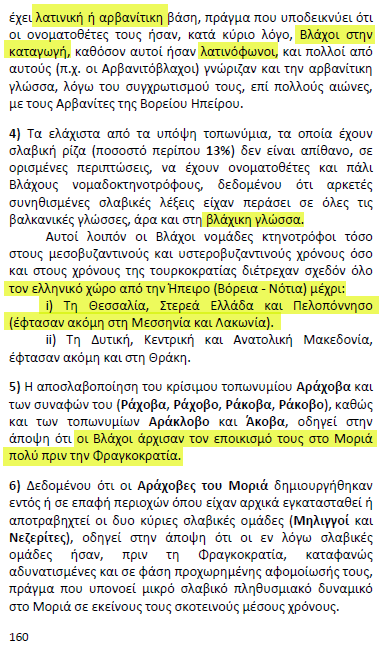 Last edited by Carlin; 05-14-2017, 12:55 AM.
Last edited by Carlin; 05-14-2017, 12:55 AM.
Comment
-
-
1) "For his part, François Pouqueville evokes colonies established by refugees of Slavic and Vlach origin from northern Greece and if Slavo-Vlach etymologies are good, Tripolitsa could be one of them."
Tripoli (Grèce)
https://fr.wikipedia.org/wiki/Tripoli_(Gr%C3%A8ce)
La ville fut fondée vers le xive siècle. Son nom grec de « Tripolitsa » pourrait peut-être se référer aux trois villes alors abandonnées de Mantinée, Tégée et Pallantion. Au Moyen Âge, elle apparaît sous les noms de « Dobrolica » signifiant en slave, selon les interprétations, « bon lieu » ou « ville aux chênes », de « Drobolitsa » signifiant en valaque « morcelé, fragmenté, partagé »2, de « Tripolizza » pour les génois et les vénitiens au xviie siècle, et de « Tarabolusa » pour les turcs3. De son côté, François Pouqueville évoque des colonies établies par des réfugiés d'origine slave et valaque venus du nord de la Grèce4 et si les étymologies slavo-valaques sont les bonnes, Tripolitsa pourrait être l'une d'elles.
↑ François Pouqueville, Mémoire sur les colonies valaques établies dans les montagnes de la Grèce depuis Fienne jusque dans la Morée, Ernest Desplaces, Paris 1834, dans Louis Gabriel Michaud, « Biographie Universelle » vol. 34, sur
Mémoire sur les colonies valaques établies dans les montagnes de la Grèce
2) "Presence of Vlachs (Aromanians) in Koroni and Morea"
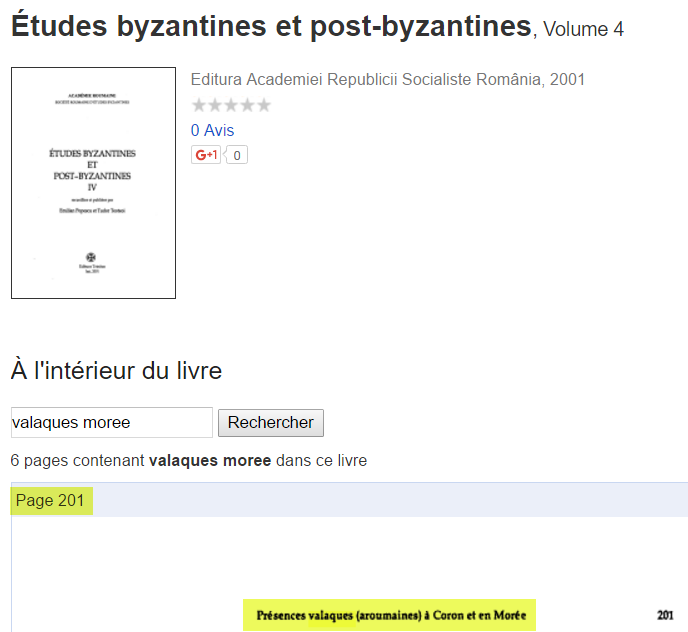 Last edited by Carlin; 05-14-2017, 10:22 AM.
Last edited by Carlin; 05-14-2017, 10:22 AM.
Comment
-
-
Some still doubt the historical and documented presence of Vlachs all over the Peloponnese.
1) Οι Βλάχοι στην Κορινθία --> The Vlachs in Corinthia (by Τρίτος Μ.)
URL:
2) Seyed Mohamed Taghi Shariat-Panahi, Ἀρβανῖτες καί Βλάχοι στόν Καζᾶ τῆς Κορίνθου: βάση τῶν ὀθωμανικῶν ἐγγράφων (15ος-18ος αἰ.). --> Albanians and Vlachs in the Kaza of Corinth according to the Ottoman registers (15th-18th century).
URL (reference on page 25):
Last edited by Carlin; 05-27-2017, 07:42 AM.
Comment
-
-
I would need to do more research.Originally posted by tchaiku View PostCarlin is there any Byzantine document reffering to lower Vlachia in Achaia?
As I mentioned in post #4 of this thread, author Zef Mirdita in his work "Vlasi, polinomichan narod" (on page 257) refers to Achaia as Lower Wallachia (Donja Vlashka).
Comment
-
-
URL:
 ΜΟΡΑΪΤΕΣ ΣΚΗΝΙΤΕΣ ΒΛΑΧΟΙ Τσεκουραίοι, Τσιρικαίοι, Καλυβαίοι, Γκοκακαίοι, Κορδολαίοι, Φλιγκαίοι, Τσακουμακαίοι, Ντουλαίοι, Τσογκαίοι, Θανασου...
ΜΟΡΑΪΤΕΣ ΣΚΗΝΙΤΕΣ ΒΛΑΧΟΙ Τσεκουραίοι, Τσιρικαίοι, Καλυβαίοι, Γκοκακαίοι, Κορδολαίοι, Φλιγκαίοι, Τσακουμακαίοι, Ντουλαίοι, Τσογκαίοι, Θανασου...
ΜΟΡΑΪΤΕΣ ΣΚΗΝΙΤΕΣ ΒΛΑΧΟΙ!
Most of the vlachs have settled in Corinthia (50%!), Achaia (20%!), Argolida (10%!), Ilia (15%) and (5%) Megara and Salamina.
- Στην επανάσταση του 1821 συνέβαλαν σημαντικά στον αγώνα πρισφέροντας στρατιώτες και τρόφιμα γι αυτό ο Ιμπραήμ κατευθυνόμενος προς Κόρινθο είχε βάλει πρωταρχικό του στόχο να καταστρέψει τους ΄βλάχους’ και την κτηνοτροφία της Ζήριας.
- Στα τέλη του 19ου αιώνα και στις αρχές του 20ου αιώνα ‘οι σκηνίτες βλάχοι’ βρίσκονταν στο απόγειο της δόξας τους. Κοπάδια με χιλιάδες γιδοπρόβατα, βαλμαδιά με εκατοντάδες άλογα, αμέτρητα παιδιά κι εγγόνια και χιλιάδες λίρες που θα τους επιτρέψουν αργότερα να κάνουν μεγάλες αγορές.
- Το μεγαλύτερο μέρος των 'σκηνιτών βλάχων' έχουν εγκατασταθεί στην Κορινθία (50%), στην Αχαϊα (20%), στην Αργολία (10%), στην Ηλεία (15%) και (5%) στη περιοχή των Μεγάρων και Σαλαμίνας.Last edited by Carlin; 05-27-2017, 09:31 AM.
Comment
-
-
Roughly half of the ΣΚΗΝΙΤΕΣ ΒΛΑΧΟΙ-Vlachs settled in Corinthia, 20% of them in Achaia, 10% in Argolida, etc.Originally posted by tchaiku View PostWhat does the 50% stand for? Does it mean that half of Corinthia was Vlachian or that half of the Vlachs settled there
Note that these ΣΚΗΝΙΤΕΣ ΒΛΑΧΟΙ were a particular and specific group of "Vlachs" (tent-dwellers). They were 'recent' arrivals, and different from others in the area. There were other "older Vlachs" in Corinthia (and all other areas of Morea), who were actually bilingual and spoke Greek (even at the time of their arrival to Morea).
Οι βλάχοι που εγκαταστάθηκαν στην Καρυά μιλούσαν ελληνικά και δεν ήταν σκηνίτες, σε αντίθεση με τους νεότερους βλάχους, που ήρθαν στην περιοχή της Ζήρειας κατά το 1800 και αργότερα στην Καρυά και στα ʼνω Τρίκαλα. Αυτοί μιλούσαν και κάποια Ρουμανική διάλεκτο και έφτιαχναν το κονάκι τους στην περιοχή που έβοσκαν τα κοπάδια τους.
The Vlachs settled in Karya spoke Greek and were not ΣΚΗΝΙΤΕΣ, as opposed to the younger Vlachs, who came to the Zireia region in 1800s and later to Karya and to Trikala. They also spoke some Romanian dialect...
URL:
http://www.korinthia.net/dim-xylokastrou--karya.htm
Comment
-

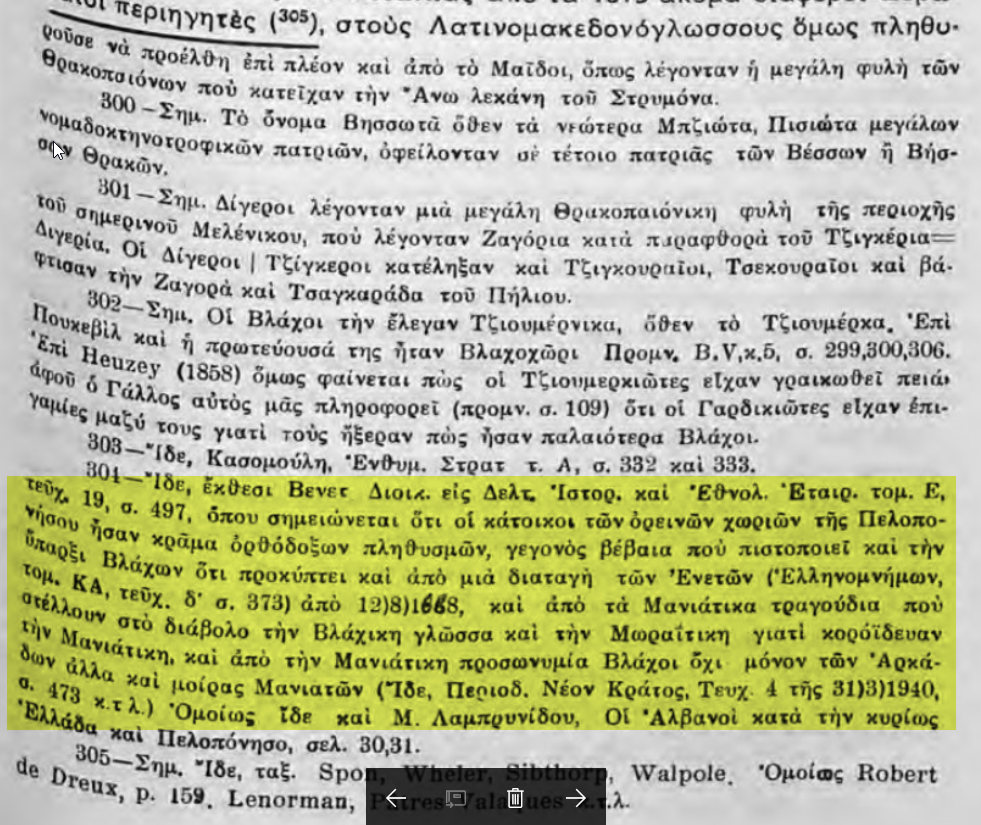

Comment